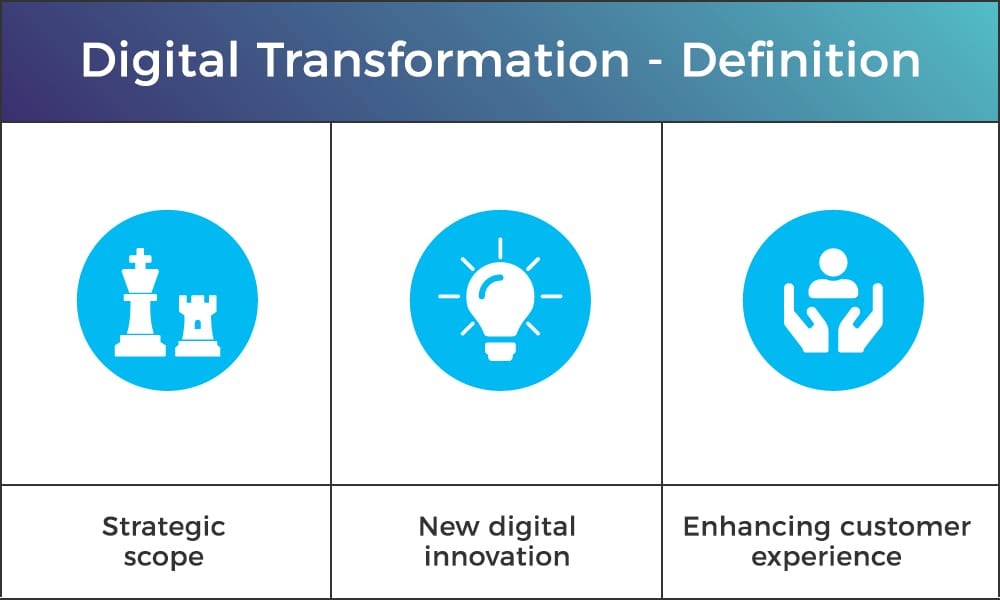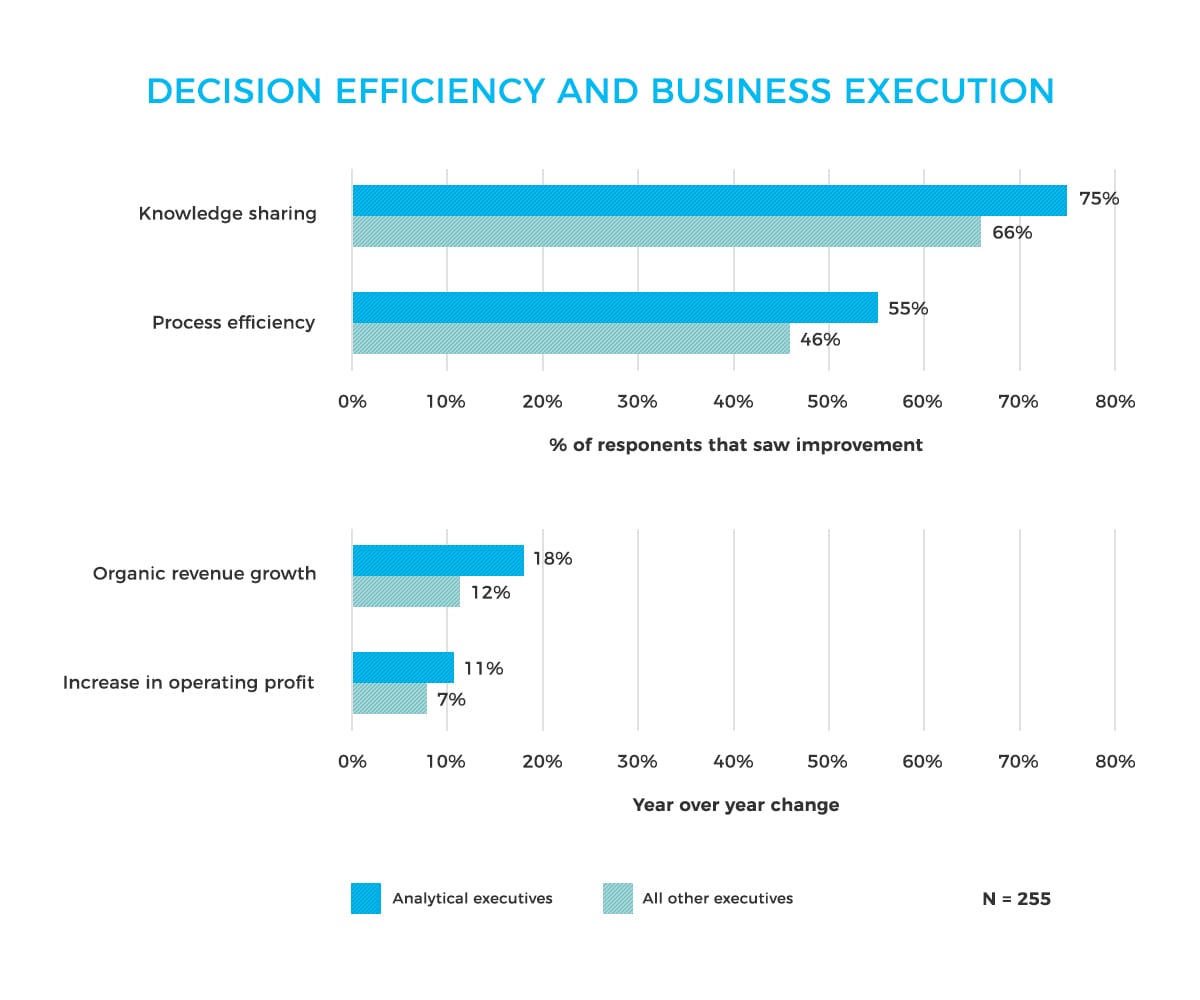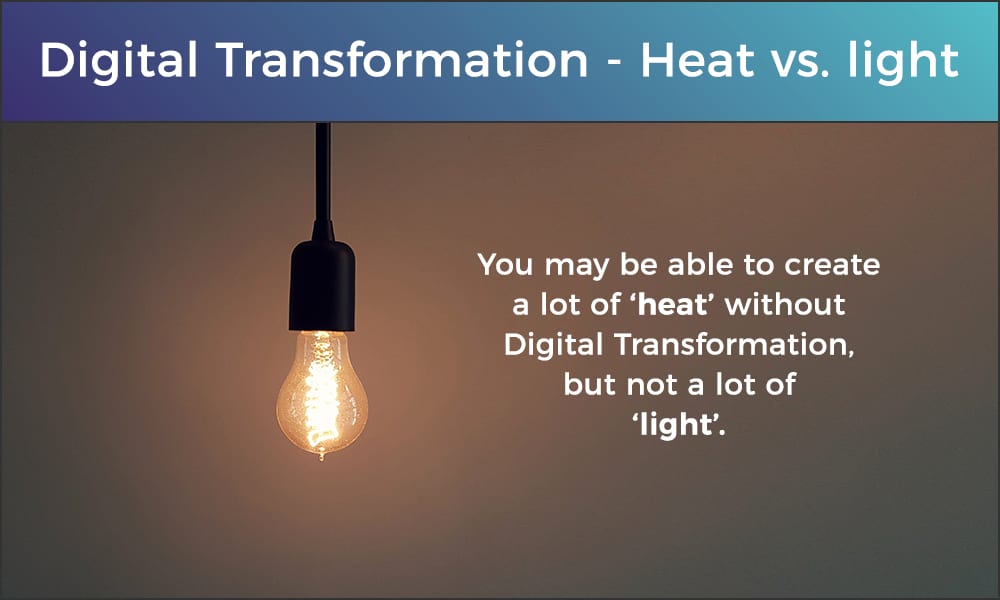In this guest post, Scio+ CEO Casper Tribler provides an original definition of digital transformation. He goes on to say that successfully achieving digital transformation does not depend on mastery of technology. Rather it requires an organization’s leadership to articulate a clear digital strategy for the future. Data-driven decisions are key in disruptive times such as ours, where digital transformation is “a never-ending endeavor”.
Our ability to digitally transform companies, governments, healthcare, education, legal systems, law enforcement, communication, finance etc. are pushing forward new digital strategies and increased focus on digital leadership. Such leadership is required across all levels of the horizontal and vertical organizational grid, and across all age groups. The current workforce wants to work for businesses that are digital ambitious, and being a digital risk taker is becoming a necessity for employees to stay attractive as well as organizations to stay competitive within their core activity.
To stay competitive as an employee and an organization Digital Transformation has to be an integrated part of who we are and what we do.
A study presented by Deloitte explains that employees want to work for digital leaders, and across the age groups from 22 to 60 the vast majority of respondents want to work for digitally enabled organizations. Leaders need to bear this in mind in order to attract and retain the best talent needed to transform their digital strategy into digital reality. Many leaders tend to believe that Digital Transformation is driven by technology, but it could not be further from the truth; as Cap Gemini explains it:
Digital transformation is first and foremost a business transformation. People, not technology, are the most important piece in the Digital Transformation puzzle.
What is Digital Transformation?
For some Digital Transformation is just another term that is used with increased frequency these days together with other trendy terms such as Disruptive Innovation, Internet of Things, Data Lakes, Machine Learning, SMAC, Code Halos etc.
I have heard the term Digital Transformation described in a rich variety of ways by my industry colleagues within IT and Telecom, and it is evident that Digital Transformation means different things to different people. Some describe Digital Transformation as creating a digital culture centered around a strong brand idea, or that it is about getting a company to be more digital native, acquire new skills and capabilities to be data driven and ultimately more customer centric, and some refer to the concept of ‘going paperless’, or that Digital Transformation changes companies so they can take advantage of new opportunities and face the challenges from the technical world. My response to these definitions are that Digital Transformation is all that and much more. However, this leaves us with a rather elusive concept and it would be quite helpful if we had a more defined understanding of Digital Transformation.
From studying various publications, I managed to put together below definition that I would like to share with you:
Digital Transformation
(definition)
Strategically embrace new digital innovations enhancing the customer experience

- Strategic: Ever evolving strategic exercise promoted by the relevant leadership, which are then required to be translated into clearly defined tactical and operational goals ensuring long-term commitment and ongoing momentum.
- New digital innovations: Move the organization forward compared to its current digital capabilities enabling new types of innovation and creativity in a particular domain, rather than simply enhance, support and rely on existing technologies. The transformation is focused on digital initiatives and integrations within the organization, such as for example Internet of Things, or social, mobile, analytics and cloud (SMAC) and other underlying IT architectures such as big data, Data Lakes etc.
- Customer experience: Ensure that the overall goal from the Digital Transformation is to deliver an enhanced customer experience having a positive impact on the organization’s performance for example on its revenue, profit, share price etc.
What drives digital leadership?
The persistent evolution of technology is a source of constant inspiration to redefine the way we exist (co-exist) as a species. Digital Transformation has become the ultimate challenge in change management because it impacts not only organizational structures and strategic positioning, but all levels of society (every task, activity, process).
Leaders must constantly challenge their organizations to ensure that this technology-enabled change can unlock productivity gains and competitive advantages, and understand where and how the fundamentals of their current operations could be unsettled by agile new entrants or new business models.
Today’s leaders need insights to validate strategic and tactical decisions quickly, which requires access to large volumes of data, from an increasing number of different information channels and preferably real-time. As a consequence, leaders are becoming more personally involved in generating their own tailor-made insights rather than simply reading a pre-canned report or analysis. And if you are an ambitious leader that likes to be in control of your own destiny, what better way to reach such enlightenment than spearheading the Digital Transformation of your organization?
What is digital leadership?
This may come as a surprise to some people; Digital Transformation does not demand mastery of the technologies. Instead, it requires commercial leadership to articulate the value of digital technologies as a critical part of the organization’s future.
The success of Digital Transformation is greatly dependent on the organization’s ability to commercialize its digital strategy.
Digital leaders are more likely to have a data-driven mentality when it comes to decision making rather than taking what is presented at face value; these digital leaders has a need to verify their commercial decisions through analyses:

Further to the argument that the core success driver to Digital Transformation is not technology nor technological mastery, is supported by Aberdeen Group’s study from October 2015 stating that digital leaders are:
- 73% more likely to have strong analytical knowledge within non-technical roles.
- 65% more likely to have processes in place for defining and communicating business needs for analytics.
- 38% more likely to have policies and/or tools in place for governing end-user access to data.
Successful digital leaders also understand that to get maximum ROI out of investing into Digital Transformation they have to push their organizations to accelerate the flow of information between departments, and make that information available more quickly and more broadly across the organization. In more concrete terms this means creating an environment that nurtures data-driven insight thinking, implementing clear user needs and strong policies for data governance, support more efficient decision-making processes delivering relevant capabilities to the right job roles at the right time. These are all characteristics that digital leaders foster within their organization ultimately building the foundation for lower risk, increased profitability and faster management decisions.
Why should leaders take digital seriously?
Today’s most critical decisions not only rest on the business feel and gut instinct of our leaders, but to a greater extend requires convincing insights. The involvement of data may once have been purely supporting or affirming in nature, but now plays a more central role. Even shareholders are depending more heavily on a data-driven mindsets to drive their investments forward and Digital Transformation has the tools they need to achieve their vision.
If leaders wish to stay relevant in the future adopting digital risk-taking and formulating digital strategies – if not already – will become the norm. So if leaders are not motivated by the incredible opportunities Digital Transformation in itself offers, then keeping once own job might just do the trick. Digital Transformation is here to stay and the sooner leaders get to terms with this fact the better as they will be able to take advantage from enhanced knowledge sharing, improved process efficiency, revenue growth and increased profit as findings show from Aberdeen Group study in October 2015:

Digital Transformation is here to stay
Digital Transformation is a never ending endeavor and in these disruptive times we live in the frequency of formulating new digital strategies and adopting new technologies is only expected to increase. Our future leaders must embrace Digital Transformation as their mission, and define and deliver winning digital strategies.
As many leaders have already started their organization’s digital exploration, those who have yet to begin need to take this development seriously. The sooner they transform themselves into digital leaders and start their own Digital Transformation journey, the less catching up they have to do and the more relevant they will become to their shareholders, management and employees going forward.

About the author: Casper Tribler is the CEO of Scio+, a data science company in the food production sector. Tribler is also also an entrepreneur and frequently writes on topics like digital leadership, customer insight analytics and software-as-a-service. He can be contacted via LinkedIn or Twitter.